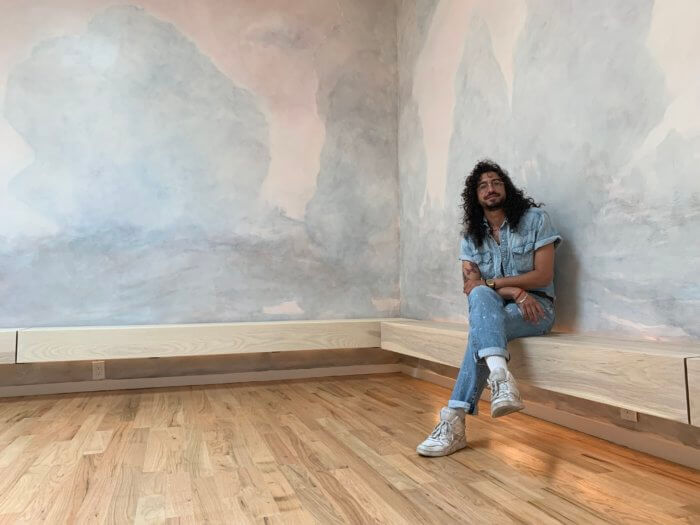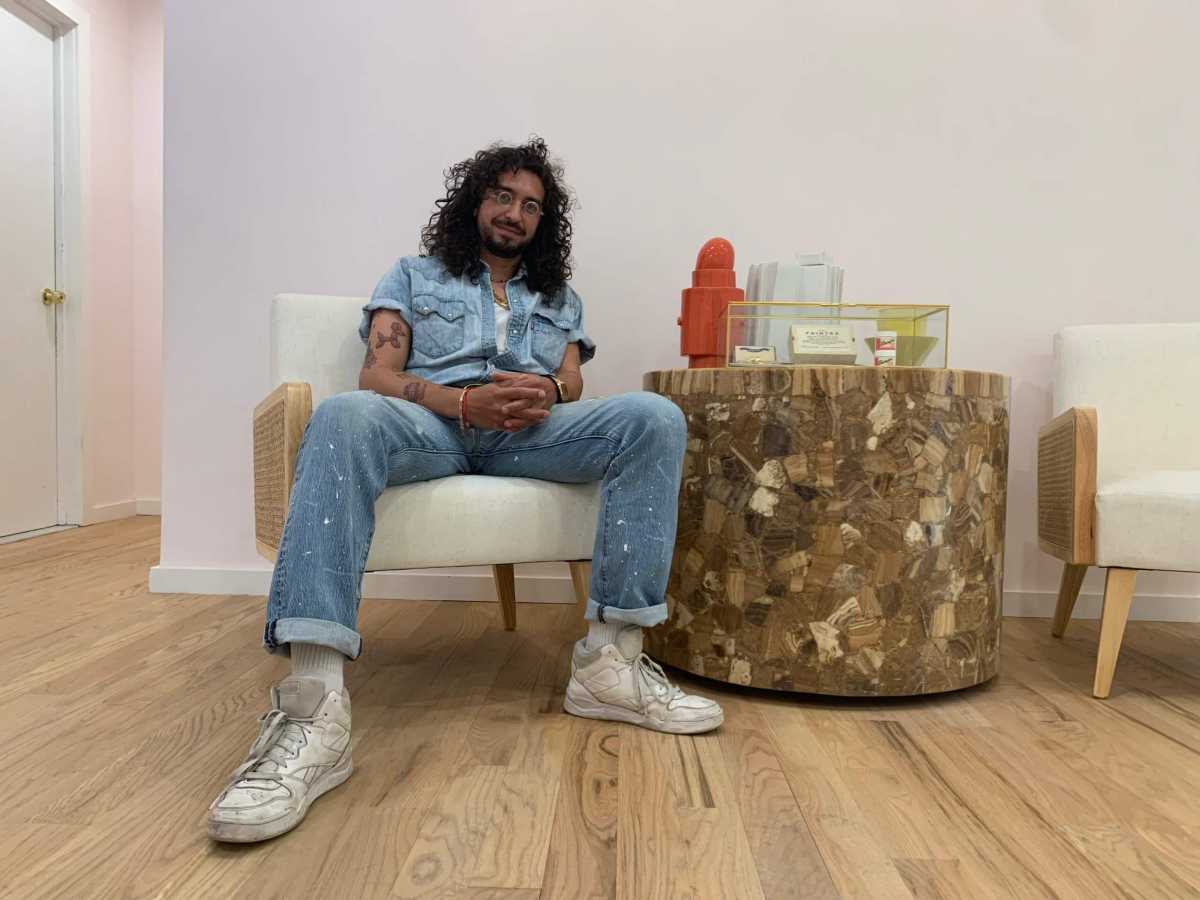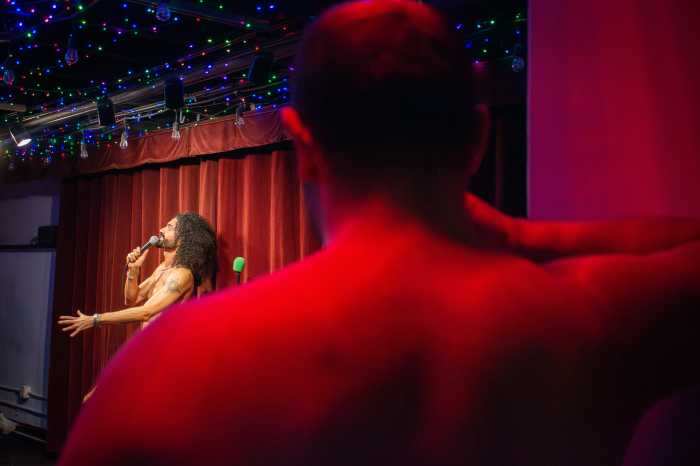On the last Saturday of every month, as comedians all over New York City are stepping onto stages to perform their sets, Brooklyn-based comedian Ben Wasserman is stepping to the front of a pastel-painted room in a Greenpoint funeral home to perform his newest show, “Live After Death.”
The venue is Sparrow, A Contemporary Funeral Home on Driggs Avenue, and the show is about grief, loss and what it feels like to still be around when someone you love is gone.
Wasserman has been doing stand-up comedy for about eight years. A “failed attempt at academia” left him disillusioned and with the feeling that he’d rather be smart than funny, he said, and for the first four years of his career, his shows were goofy and not very tethered to real life.
“And then I lost my dad, and started taking care of my grandparents,” Wasserman said. “And then my grandfather died, then my uncle died a year later, and in between four friends died. I felt like I had something that I needed to talk about, I needed to let it out, and it just seeped into the comedy.”
Before “Live After Death,” Wasserman’s grief was present in his comedy in a less intentional way, he said. About two and a half years ago, he was was starting to put a thread through a “hodgepodge” of bits about grief and death people had responded well to throughout his different shows.

“Right before the pandemic, my grief was getting better … I don’t have the same rage-fueled sets,” he said. “When I was in the throes of grief from losing people left and right, the despair that I was actually feeling would just seep in on stage.”
It’s hard for him to describe exactly what the show is, he said, and easier to talk about what it isn’t — it’s not a solemn tribute to the people he’s lost, and it’s not a declaration that death is inherently funny.
“I think a lot of times when people are doing comedy about this stuff it’s almost in avoidance of the topics,” he said. “Because it’s like, ‘Ha-ha, it’s so funny that this person died, or it’s so funny how this person died.’”
Wasserman uses “Live After Death” to say “we can talk about everything, including death and why people die at the hands of a corrupt system,” he said, and that while not everything is funny, you can laugh while talking about anything – including death. He and attendees often talk about COVID, and gun violence, and other systemic failures that have resulted in illness and death.
“There’s essentially a lot of gags and interactive stunts and bits,” he said. “It’s like, vulnerable vaudeville, a circus-y kind of thing, interspersed with what in the show are called ‘Vulnerable Moments.’”
“Vulnerable Moments” are just like regular crowd work at any other comedy show, Wasserman said, but instead of calling out someone’s outfit or asking if a pair of people sitting together are dating, he’ll ask if they’ve lost someone, or who they’re thinking about as they watch the show.
If he can find a funny detail in that story, he will, Wasserman said. But if he can’t, he’ll let it be as a sober moment in the show.
“And then it goes right back into some like, ‘I’m going to juggle now and I suck at juggling,’” Wasserman said.
If he called on someone who shared something vulnerable during the show, he might call them up later to play catch or teach him how to shave.
“It’s like, that dynamic of getting to hear someone share their deep vulnerable sadness and then be goofy is really nice,” Wasserman said. “It gets to show, kind of, the duality of all of it. If the show really has any point, it’s that death sucks, we’re still here, let’s honor both of those things.”
He’s workshopping a big sing-a-long for the show, he said, in the realm of the big group number in a Broadway musical. The only thing Wasserman’s father asked for specifically at his funeral was for everyone to sing “Here Comes the Sun” before they left, he said.
Singing together in the funeral home is fun, for one thing, Wasserman said, and it makes people feel less alone.
“A lot of people have talked to me after the show about how universalized it felt to them,” he said. “Like, they’ve experienced loss and grief but the way it was presented during the show and the way people can talk and share — there was a specific ‘not being alone’ kind of feeling.’”
Just about as important as the content of the show is the setting. Sparrow, rather than utilizing the old dark carpets and dark wood paneling so popular in funeral homes, is full of sunlight and gentle colors — the “celebration room” where Wasserman performs has light wood benches around the sides of the room and is painted in light pinks and blues.
⚰️☠️ JULY 30TH @ Sparrow Funeral Home in BK ☠️⚰️
~~ doing my funny show about grief and loss ~~🎤 opening set by @MartinUrbano
🎟️ tix: https://t.co/ojp44XN6sp pic.twitter.com/hoZywxHSqU— ben (@benwassertweet) July 5, 2022
“The whole industry is kind of designed around the feeling of admin, cookie-cutter, they all have the same gross red carpet, dark lighting, pews that are uncomfortable,” he said. “And there’s absolutely no personality on the part of the funeral home, or a way to impart any of that personality for the departing.”
He met one of the funeral home’s directors while he was still planning “Live After Death,” Wasserman said, and she explained that they were hoping Sparrow would serve as a community space, hosting events and inviting the neighborhood in for more than just grief.
The first performance of “Live After Death” at Sparrow sold out. The space is perfect, Wasserman said. It means that people know exactly what they’re getting when they buy tickets and gives me and attendees more space to sink into the show and their emotions.
Sometimes, it feels odd to be hosting a comedy show in a funeral home, even one that’s actively trying to work as a community space. Wasserman has helped out with memorials and funerals and seen families come in and out as he’s setting up for shows. He couldn’t run tech for his first performance until the day of, because there were funerals going on all week.
“During the show, everything just feels right, I think, which is cool, and rarely happens to me,” Wasserman said. “Usually, I can easily pick out where things are going wrong and it’s bad, but here when things are going bad it’s like, I don’t care, things are still working, still.”
See “Live After Death,” on Saturday, July 30 at 8 p.m. at Sparrow: A Contemporary Funeral Home in Greenpoint, or on the last Saturday of every month. Find tickets and more information on Eventbrite, and get more information on Sparrow on their website.
Correction 7/22/22 11:28am: This story previously referred to Wasserman’s comedy show as “Life After Death,” rather than “Live After Death.” We regret the error.























